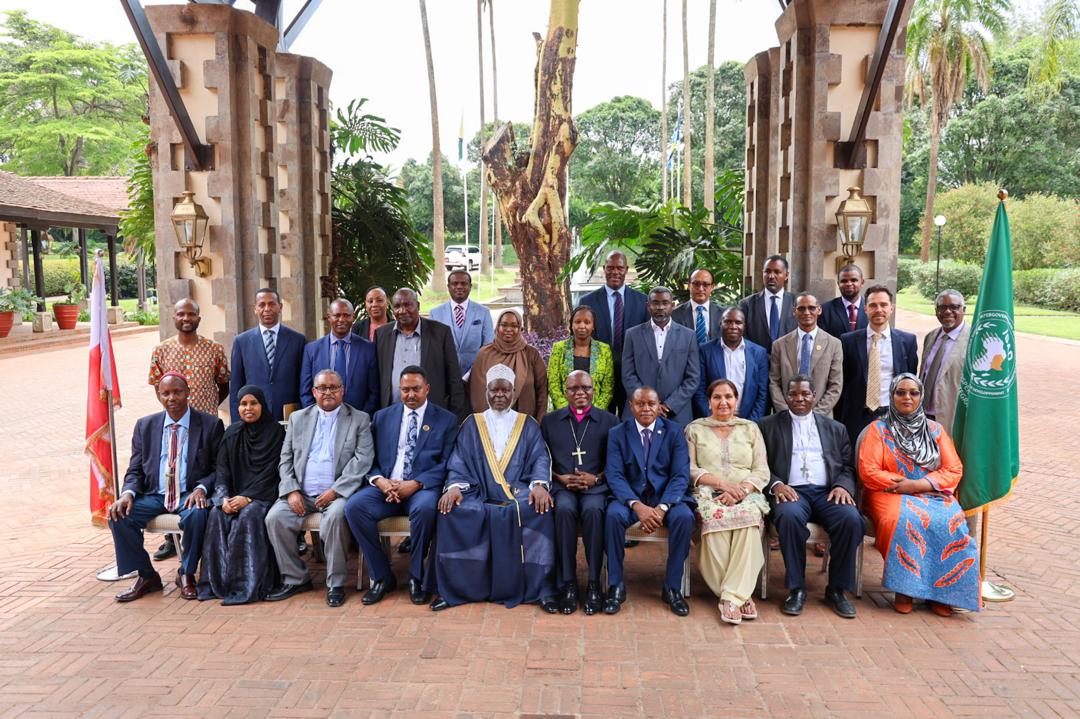
 IGAD, African Council of Religious Leaders – Religions for Peace (ACRL-RfP) pose for a picture after a meeting at Windsor Hotel in Nairobi on October 28, 2024.
IGAD, African Council of Religious Leaders – Religions for Peace (ACRL-RfP) pose for a picture after a meeting at Windsor Hotel in Nairobi on October 28, 2024.The Intergovernmental Authority on Development (IGAD) has vowed to work with the African Council of Religious Leaders – Religions for Peace (ACRL-RfP) to enhance its peace building efforts in the region.
This followed a dialogue between the two organizations led by IGAD Executive Secretary Dr Workneh Gebeyehu and the leadership of the ACRL at Windsor Hotel in Nairobi, on Monday.
Through the partnership, the organisations agreed to create dialogue spaces that promote community revitalization, to help address the region's history of conflict.
“IGAD and ACRL-RfP are committed to enhancing collaboration in peace processes and supporting conflict-affected communities, with the aim to break cycles of violence and focus on reconciliation and compassion,” reads a joint statement.
They reaffirmed their commitment to support and empower communities by leveraging the influence of religious leaders as essential partners in building a peaceful, inclusive, and resilient future.
ACRL-RfP and IGAD further called upon member states, international partners, and stakeholders to join them in advancing shared objectives for the well-being and prosperity of all countries and communities in the Greater Horn of Africa.
IGAD said it recognises the critical role religious leaders play in enhancing conflict early warning and response mechanisms and the authority intends to integrate religious networks into the Conflict Early Warning and Response Mechanism (CEWARN) to strengthen conflict prevention efforts in the region.
“IGAD welcomes the opportunity to integrate religious leaders more formally into regional mechanisms like our Conflict Early Warning and Response Mechanism (CEWARN), where you can contribute timely insights that help prevent potential conflicts,” Gebeyehu said.
“Their networks are essential for detecting tensions and facilitating timely interventions.”
He said this collaboration will not only advance the peace and security agenda in the region but also contribute to creating an environment where sustainable development thrives.
The religious leaders and IGAD further called for an immediate ceasefire in Sudan and insisted on inclusive peace talks that involve all stakeholders.
The leaders noted that dialogue towards restoring a civilian transition in Sudan will benefit positively from the influence and contribution of religious leaders in conflict mediation, humanitarian outreach, and community healing.
“The ongoing war in Sudan has led to the fastest-growing humanitarian crisis in the world, with 1 in 8 refugees worldwide being Sudanese and over 12 million displaced. Nearly 5 million face starvation due to food shortages and the destruction of essential infrastructure, including healthcare.”
They also committed to collaborate in finding solutions to other challenges the region faces including climate change, desertification, and underdevelopment in Arid and Semi-Arid Lands (ASAL), saying that these situations.

